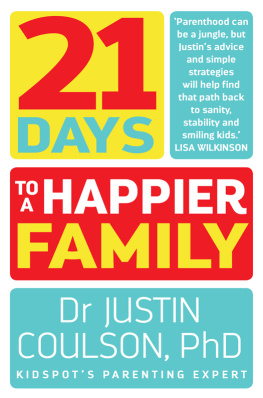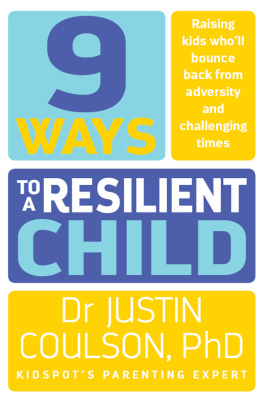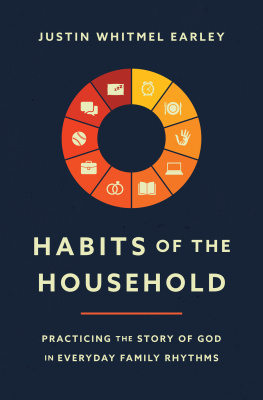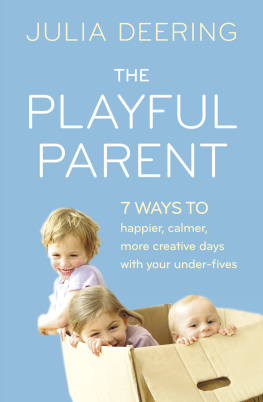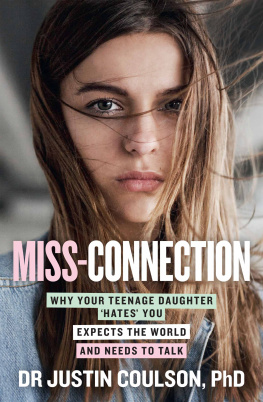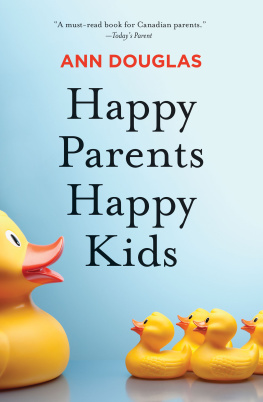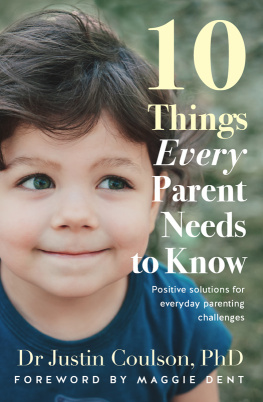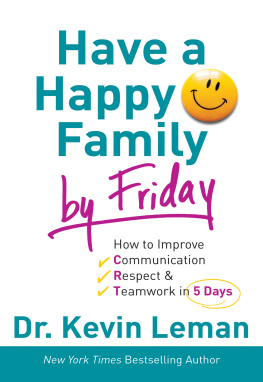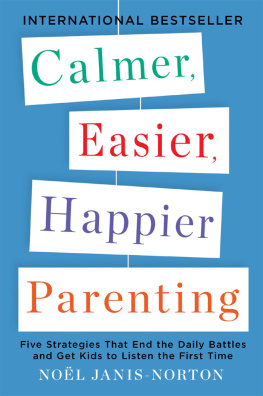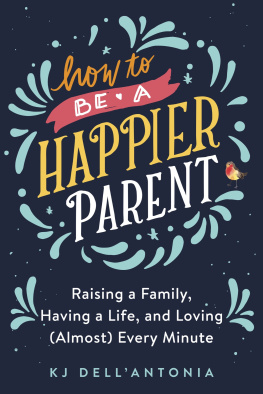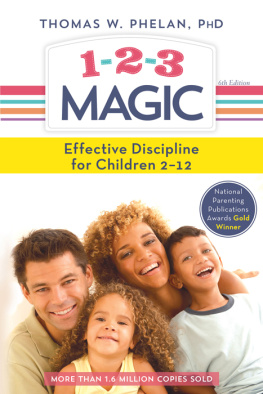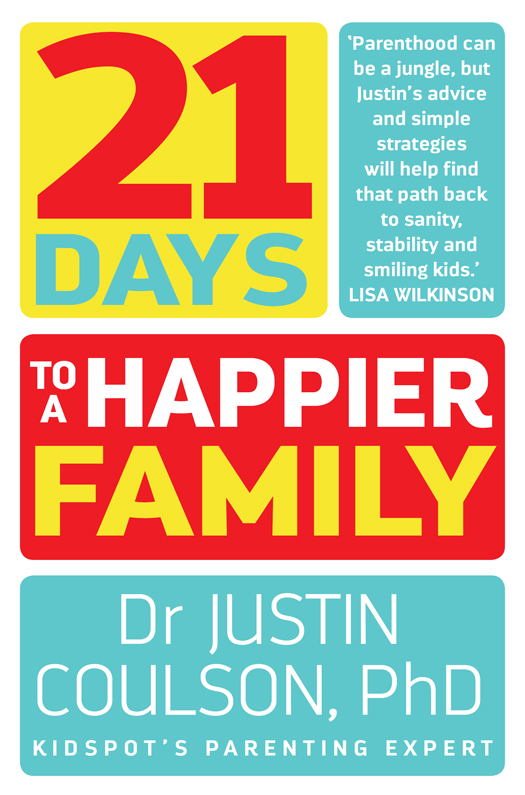For families that want to be happier
Contents
Guide
An epiphany is a funny thing. We have that light-bulb moment. We see something, hear something or think something, and in that instant everything changes for us.
We become motivated. Inspired. Committed to change to do something different. To be someone new.
But epiphanies tend to be short-lived.
Our patterns of behaving in particular ways are well established, and are therefore hard to break. It takes extraordinary sustained effort to make a commitment stick, particularly once the emotion we felt when we made the commitment or had the epiphany has passed.
But in 2002, I had an epiphany that hit hard. It changed everything. It is the reason you have this book in your hand. It was a moment that began a cascade of actions that became life-altering.
The lasting change did not occur because of one moment of insight. While the insight was a catalyst, it was the way my behaviour changed over the subsequent weeks, months and years that made the epiphany lead to a new life.
How a big mistake created a big change
We all have moments with our children that we wish we could take back. It was one of those moments that acted as a critical pivot point in my life and my familys.
Most parenting books dont start with a confession from the author. But if you are struggling in your family, I want you to know that I have been there and I often still am. Ive made the mistakes I do understand.
As a young dad I was struggling. My idea of childrearing was to have cute children who would bring me joy, grow up, go to school, become teenagers and thats that. I had clearly never contemplated the realities of parenting. I knew that other people had challenges with their children, but I guessed those parents had no idea how to say no to their children; that they were complete pushovers.
My expectation was that now and then my children would need to be told to change their behaviour, and my demands would be met. End of story.
With no preparation for parenthood and no idea about what I was doing when the children arrived, it is probably no surprise that my experience failed to match my expectations. Having a baby was a joy at times but dealing with sleepless nights, severe reflux, feeding challenges and the other usual issues left me feeling out of my depth. Using naivety as a shield for my incompetence, I passed all childrearing duties to my wife, Kylie. Fortunately, Kylie was better prepared.
But it was having a toddler that really sent me into a spin. Within months of our first daughter beginning to assert a desire for independent thought and action, I became an angry disciplinarian. I threatened. I yelled. I withdrew privileges (from a toddler!). And I smacked. Regularly.
And I could not be told, by anyone, how I might deal with the situation better.
My toddler had become the enemy and, from my perspective, had to be broken, in the same way a cowboy breaks in a horse. Toddlerhood, I decided, had to be defeated, and it was my job to tame my daughter and make sure she understood who was boss.
Youve become very hard, Justin, my grandmother gently chided me. And I agreed: Youve got to be! Otherwise the little rats will run riot all over you. (Nan was unimpressed with my response.)
My mother-in-law suggested a softer approach. She has to learn, was my instant rebuttal.
My refusal to listen to those with wisdom and experience only highlighted my immaturity. I knew better. But if I did know better, why was I struggling so badly?
My punitive responses to my toddlers challenging behaviour increased. She turned three. The terrible twos migrated with her into a new, harder-to-deal-with age-bracket. As my toddler grew, I expected more of her, but she wasnt getting any easier to manage. And despite being aware that what I was doing wasnt working, I became increasingly convinced that I had to be hard on my daughter to stop those toddler tantrums. After all, if something doesnt work, you should do more of it to get a result, shouldnt you?
One Saturday afternoon, Kylie left our two children with me while she ran a short errand. Our baby, Abbie, was just a couple of months old. Chanel was three years older to the day. Me, I had been up late the night before and only slept a handful of hours before getting up for work at 5am that Saturday morning. I was exhausted.
Within moments of Kylie leaving, Chanel began to act up. My efforts to calm her, by telling her to Stop it now!, were ineffective. Her tantrum escalated. Her fraught emotions were contagious and it didnt take any time at all for me to catch the intensity of them. As her tantrum began to build I matched her upset with my anger.
My first reaction was to threaten her. Then I moved on to punishing my three-year-old by locking her in her room. Next I yelled and threatened because she was kicking the door. She responded with more anger and so I opened the door and dragged her into the living room, where I smacked her. Several times. Hard.
She had to learn a lesson. She had to respect me. I was in charge.
It will come as no surprise to any experienced parent that my discipline brought with it unintended consequences. Chanel became louder. She screamed more, rather than less. She cried. And, for some reason, I had expected something different?
Now I was scared the baby would wake up. My anger increased and my response was furious. I forced Chanel back into her bedroom and threw her onto her bed amid a torrid combination of my venomous threats and her frightened and angry screams, cries and tears. Angry at her, and angry at myself, I held the door handle as she sobbed, kicked and tried to get out of her room. I hated being out of control. And I hated her for making me feel and act this way. Yet something told me that Chanel had not made me do anything. In my heart I knew that I was responsible for how I had behaved. Not her. She was acting like a toddler. And me? I was having as big a tantrum as she was. Only I was double her height and seven times her weight. I had betrayed her with my anger. But I had also betrayed myself, and I had used her as a justification for my angry behaviour.
As I hung onto that door handle, the light-bulb moment occurred. This is not how a father ought to treat his child. A quote came to mind: The only time a father should lay his hands on his children is to bless them. And I was falling short. My hands were anything but a blessing to my little one. If I was being like this with a three-year-old, how was I going to survive with a 16-year-old? And how would she survive?
When Chanel finally stopped fighting with the door handle and, I guess, helplessly succumbed to her bedroom prison, I walked into the backyard for some air. And some clarity. With my back against the door, I stared at the overgrown former vegetable patch of our rental property and tried to drink in the newfound peace of this quiet, sunny Queensland afternoon. But there was no peace inside me only guilt-induced emotional pain.
I am a bad father.
I knew it. In spite of all of the wonderful interactions Id had with my daughter, I was getting it wrong every time her behaviour became challenging. And I had no idea what to do about it. My impatient responses lacked any semblance of understanding, perspective, compassion or kindness. I was only interested in stopping her from being so damn inconvenient. The only tool I was using was my power to coerce and control, and the power struggles were harming her trust in me. I also knew Kylie was wondering what kind of a person she had married.
I was failing my family.

